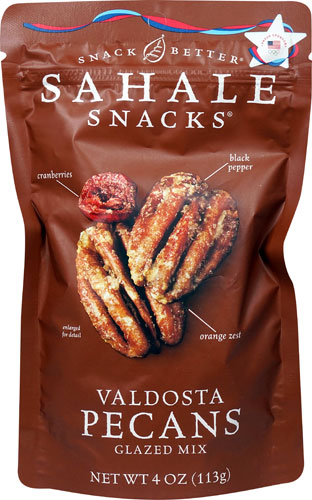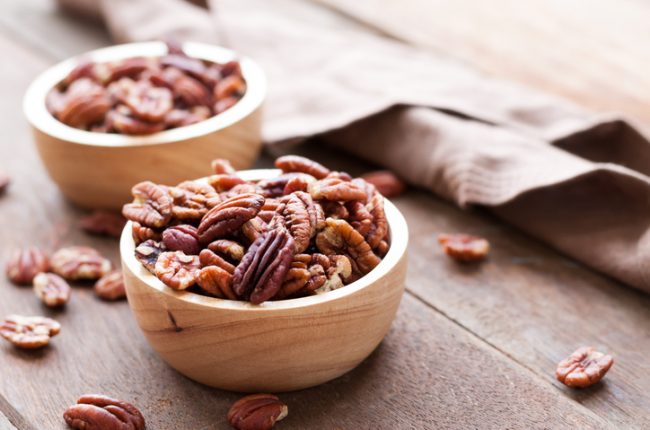Pity the poor pecan. We just aren’t as nuts about pecans as we are about almonds.
“Domestic consumption has been flat for decades in the U.S. People eat about the same amount of pecans they always have, and it’s not a lot,” Monte Nesbitt, a horticulturist for the Texas A&M AgriLife Extension Service, says in a news release. “We eat about a half pound per person per year, so there is a lot of room to increase that.”
Often viewed mainly as a seasonal nut featured in recipes for holiday favorites like pecan pie, the underappreciated pecan deserves more of our attention as a year-round complement to our diets. If for no other reason, research suggests that eating 1½ ounces per day of most nuts, such as pecans, as part of a diet low in saturated fat and cholesterol might reduce the risk of heart disease, according to the American Pecan Council.
In all, four studies of pecans and heart health have been published, and other studies are underway, the American Pecan Council says. So far, though, research hasn’t pointed to a definitive connection between pecans and heart health.
However, a 2014 study published in the New England Journal of Medicine found that increased nut consumption has been linked to a lower risk of major chronic diseases, including cardiovascular disease and type 2 diabetes.
Here are several other nutrition facts, courtesy of the American Pecan Council, that make the case for America’s only native nut. One serving of pecans (28 grams) offers:
- 3 grams of plant-based protein.
- 18 grams of unsaturated fat and 2 grams of saturated fat.
- 10 milligrams of flavonoids (a level comparable to some superfruits).
- 36 milligrams of plant sterols.
- 7 milligrams of vitamin E.
- 11 percent of the daily value of dietary fiber.
- 60 percent of the daily value of manganese.
- 40 percent of the daily value of copper.
- 10 percent of the daily value of zinc.
Registered dietitian and certified dietitian/nutritionist Vanessa Rissetto likes pecans for several reasons. For one thing, they’re chock-full of vitamins and minerals. Furthermore, she adds, USDA research shows pecans are the most antioxidant-rich tree nut and rank among the top 15 foods with the highest levels of antioxidants.
Aside from being on par health-wise with other tree nuts — including almonds, walnuts and pistachios — pecans are delicious, the American Pecan Council boasts. Pecans “have a naturally sweet and rich, buttery taste that many chefs and food experts prefer,” the council says.
Registered dietitian Megan Wolf, head of nutrition at Weight Zen, which provides weight loss services, recommends her clients include pecans or other sources of healthy fat in every meal.
“Adding pecans to a salad is an excellent way to enjoy more crunch without added carbohydrate-heavy croutons,” Wolf says, “and is a perfect way to get more heart-healthy fats onto your plate.”
While pecans are brimming with nutritional and culinary benefits, Wolf cautions that their energy density is high, meaning a small amount is packed with calories and fat. That’s also the case with other nuts, she adds.
“This is not to say that we cannot enjoy [pecans] in moderation. We absolutely should,” Wolf says. “It’s just a note that the calories will add up quickly.”
One ounce of pecans contains nearly 200 calories, according to the U.S. Department of Agriculture (USDA).
“A serving [of pecans] is only about 19 halves, so they are easy to overeat if you are not being mindful,” registered dietitian Molly Cleary says. “Try measuring them out instead of eating them straight from the jar or bag.”
Put another way, you’ll find about 680 calories and 71 grams of fat in one cup of pecans, says Rissetto, who echoes the warning about exercising portion control with these nuts.
“People often make the mistake that because it’s a healthy fat, they can eat as much of it as they want. The appropriate serving size [for pecans] would be about five total, which actually isn’t very many at all,” Rissetto says.
As for that pecan pie, you might want to skip it altogether. One slice of pecan pie serves up a whopping 500 calories and 27 grams of fat, according to the USDA. If you’re craving pie at a holiday dinner, pick the pumpkin pie over the pecan, nutrition experts say, as the pumpkin version has fewer calories and less fat.
But on an everyday basis, pecans — when they’re not baked into gut-busting pies — definitely have a place at the table.
“We are now recognizing that pecans are a valuable food crop,” Texas A&M’s Nesbitt says. “A pecan is dense in terms of its nutritional value, has great flavor, and has proven heart-health benefits and antioxidants. Nuts are popular on high-protein diets, so there is a potential place [for pecans] in a lot of the dietary programs that are popular right now.”




